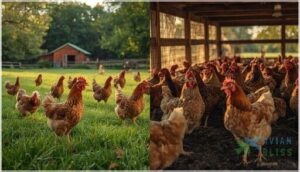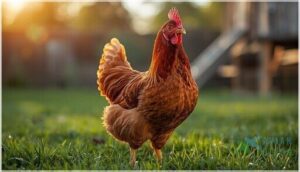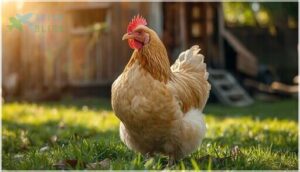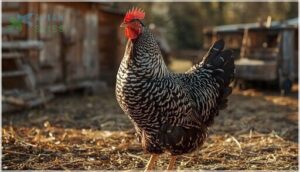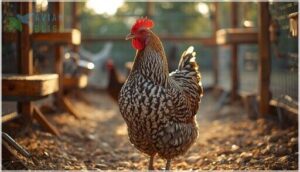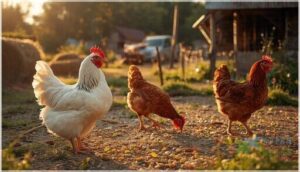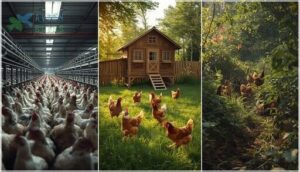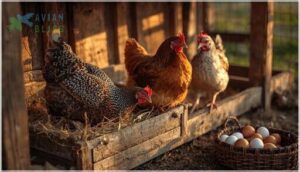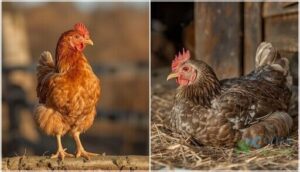This site is supported by our readers. We may earn a commission, at no cost to you, if you purchase through links.

Production hybrids, bred for intense egg-laying, usually fade much earlier as their bodies wear down from the metabolic demands.
Understanding what determines longevity—from breed selection and nutrition to housing quality and disease prevention—gives you the tools to help your flock thrive well beyond average expectations.
Table Of Contents
- Key Takeaways
- How Long Do Chickens Live?
- What Factors Affect Chicken Lifespan?
- Chicken Breeds With The Longest Lifespans
- Chicken Breeds With The Shortest Lifespans
- Chicken Lifespan in Different Environments
- How Long Do Chickens Lay Eggs?
- Common Causes of Premature Chicken Death
- Tips to Extend Your Chicken’s Life
- Signs of Aging in Chickens
- Frequently Asked Questions (FAQs)
- What is the average lifespan of a chicken?
- How long do pet chickens live?
- How long do chickens last?
- How long do hybrid chickens live?
- How long do hens live?
- How long do heritage chickens live?
- How long does a production chicken live?
- How long do Cochin chickens live?
- What factors affect the life expectancy of chickens?
- How long do chickens live in the wild?
- Conclusion
Key Takeaways
- Backyard chickens typically live 6-10 years with proper care, while commercial layers are culled at 18-24 months and broilers at 6-8 weeks—your management decisions directly determine whether birds reach their natural lifespan or fade early.
- Heritage breeds like Rhode Island Reds and Orpingtons routinely reach 8-12 years, whereas production hybrids bred for intense egg-laying (ISA Browns, Golden Comets) burn out in just 2-5 years due to metabolic strain from overproduction.
- The primary killers cutting chicken lives short aren’t mysterious—predation claims nearly 8% of backyard flocks annually, while nutritional deficiencies, parasites, disease exposure, and environmental stressors account for most premature deaths you can actually prevent.
- Extending lifespan requires addressing controllable factors: secure housing with proper ventilation and space (3-4 sq ft indoors, 10 outdoors per bird), balanced nutrition with 16-19% protein and adequate calcium, regular health monitoring, biosecurity protocols, and stress reduction through appropriate stocking densities.
How Long Do Chickens Live?
If you’re raising backyard chickens or considering getting some, you’re probably wondering how many years you’ll have with your flock. The answer isn’t one-size-fits-all—chicken lifespans vary quite a bit depending on breed, care, and environment.
Let’s look at what you can realistically expect regarding how long your chickens will live.
Average Chicken Lifespan
Most domestic chickens live 5 to 10 years under standard conditions, though chicken longevity varies considerably based on your flock management approach. Well-cared-for backyard birds often reach 8 to 10 years, while commercial egg production contexts dramatically reduce lifespan—hens are usually culled after just 18 to 24 months.
Factors affecting chicken lifespan include breed selection, poultry health protocols, and environmental conditions, making your care decisions critical. Understanding the impact of chicken farm conditions is essential for improving their lifespan.
Lifespan Range in Backyard Flocks
Your backyard chickens usually live 6 to 8 years with proper flock management, though some reach a decade or beyond. Mortality rates average around 5% annually in well-maintained flocks, while poorly managed conditions can reduce lifespans to just 3 to 4 years. Breed variance matters considerably—heritage varieties often reach 8 to 10 years, while hybrid layers survive only 2 to 3 years.
- Backyard conditions directly shape chicken longevity through protection from predators and disease exposure
- Heritage breeds consistently outlive production hybrids by several years under identical care protocols
- Annual mortality drops substantially when you implement proper biosecurity and preventive health measures
Understanding chicken lifespan factors is essential for maintaining a healthy flock.
Exceptional Lifespan Records
While most chickens reach 6 to 10 years, unusual longevity factors have pushed species records far beyond that range. Muffy, a Red Quill Muffed American Game, lived 23 years and 152 days—the all-time record. Peanut reached 21 years, while Pearl currently holds the title for oldest living chicken at 14 years.
While most chickens live 6 to 10 years, the record holder—Muffy—lived an astonishing 23 years and 152 days
These record-breaking chicken longevities resulted from indoor housing, minimal egg production stress, and individualized veterinary care.
What Factors Affect Chicken Lifespan?
Your chicken’s lifespan isn’t just about luck—it’s shaped by several key factors you can actually control. Some elements, like genetics, are set from the start, while others depend entirely on the care you provide.
Let’s look at what really determines how long your flock will thrive.
Genetics and Breed
Your chicken’s genetic blueprint shapes how many years you’ll have together. Heritage breeds like Silkies and Wyandottes can reach 7–12 years, while hybrids bred for rapid growth—think ISA Browns—often live just 2–3 years.
Breed selection matters: slower-growing lines with genetic diversity tend to avoid the metabolic strain that cuts lives short. Hereditary factors influence everything from heart health to climate adaptation, making chicken genetics a cornerstone of longevity.
Diet and Nutrition
Nutrition fuels every year you’ll spend with your flock. You need to provide 19–21% protein during growth, then 15–19% for layers—along with 3.6–4.2% calcium to keep bones and shells strong.
Vitamin D3 and balanced mineral ratios prevent metabolic collapse, while quality feed with proper nutrient ratios protects against deficiency-related mortality.
Poor chicken nutrition shortens lives; excellent diets extend them.
Housing and Care
Your chickens need 3–4 square feet indoors and 10 outdoors per bird—not suggestions, but survival metrics. Proper coop design with adequate roosting bars, nesting boxes, and ventilation systems directly reduces stress biomarkers and mortality.
Backyard chickens thrive when chicken wire enclosures prevent predators, while regular cleaning and disinfection after each flock cycle block Marek’s, Salmonella, and respiratory disease.
Dense, dirty housing kills; spacious, clean chicken care extends life.
Disease and Parasites
Viral outbreaks like Newcastle disease and Infectious Bronchitis strike over 80% of flocks in some regions, while helminth parasites infect nearly 8 in 10 chickens globally. These threats shorten lives through organ damage, anemia, and secondary infections.
Your biosecurity measures—quarantining new birds, controlling rodents, and maintaining flock hygiene—directly determine whether disease transmission devastates your flock or your chickens reach their natural lifespan potential.
Predator Exposure
Predation quietly steals years from your flock—studies show about 3.7% of hens are killed by predators annually, with foxes, raccoons, and hawks accounting for most losses.
Your coop designs and predator deterrents make the difference between chickens reaching their natural lifespan and premature death.
Secure fencing, hardware cloth, and vigilant flock security during vulnerable dawn and dusk hours form your frontline attack prevention strategy against chicken predators.
Stress Levels
Your flock’s chronic stress quietly drains years from their lives—physiological responses like elevated corticosterone and weakened immunity directly reduce chicken lifespan. Environmental factors including overcrowding, heat extremes, and poor housing trigger behavioral changes such as feather pecking and reduced activity.
Effective stress management means maintaining proper stocking density, stable temperatures, and calm routines. By reducing stressors through thoughtful chicken behavior observation and stress reduction practices, you’ll protect both their health and longevity.
Chicken Breeds With The Longest Lifespans
If you’re planning to keep chickens for the long haul, breed selection matters more than you might think. Some breeds are built for resilience and can thrive well into their second decade with proper care, while others face genetic challenges that naturally shorten their time with you.
Let’s look at six breeds known for their impressive longevity.
Rhode Island Red
Rhode Island Red chickens stand out for their noteworthy longevity. Heritage strains commonly reach 9 to 10 years, with remarkable individuals living up to 15 years under ideal conditions.
Your production strains usually live 5 to 8 years, though proper flock management, nutrition tips, and breeding techniques greatly influence chicken lifespan.
Red genetics contribute to their strong health and adaptability, making them excellent choices for backyard chicken health and consistent egg laying.
Orpington
Orpington chickens usually live 8 to 10 years, with some individuals exceeding a decade in well-managed flocks. Their calm temperament and sturdy physique encourage longer chicken lifespans when you prioritize Orpington care fundamentals—clean housing, quality feed for egg laying and feather health, and attentive flock dynamics.
Unusual cases have reached their late teens, though breeding tips emphasize that production-focused lines may not match heritage strains’ longevity potential.
Plymouth Rock
Plymouth Rock chickens generally live 8 to 10 years, with some reaching 10 to 12 years under high-quality care. Their dual-purpose genetics and longevity support both egg production and companionship, making them excellent for flock management.
You’ll find their chicken breed life expectancy hinges on balanced nutrition and secure housing. Breed history shows they’re hardy, though monitoring for health issues maintains their sturdy chicken lifespan potential.
Wyandotte
Wyandotte care combines attention to environment and nutrition, allowing these hardy birds to reach 6 to 12 years—well beyond typical chicken breed life expectancy. Their disease resistance bolsters chicken health and care goals, while balanced feeding tips enhance both egg production and chicken genetics and longevity.
To extend chicken lifespan:
- Provide stable housing with predator protection
- Offer consistent, balanced nutrition year-round
- Monitor for breed-specific health issues regularly
- Maintain clean, low-stress environments
Breed history confirms their durability across varied climates.
Bantams
Smaller body size often means a longer run. Bantams routinely reach 10 to 15 years when predator-free environments and balanced diets support their naturally lower metabolic demands.
Heritage breed bantams and companion flocks benefit from minimal production pressure, preserving chicken genetics and longevity.
Regular health checks, proper bantam care, and attention to small flock dynamics help these mini breeds maintain vitality across their extended chicken lifespan.
Silkies
Silkies stand out in chicken breeds with their calm Silkie behavior and gentle flock dynamics, often reaching 8 to 10 years. Their unique feathering demands specialized feather care, yet proper Silkie nutrition and attention to Silkie health support impressive chicken lifespan outcomes.
These heritage breed favorites thrive with consistent management, making them rewarding companions for backyard keepers focused on chicken health and longevity.
Chicken Breeds With The Shortest Lifespans
Not all chickens are bred for longevity. Some breeds are developed specifically for high egg production or rapid meat growth, which often comes at the cost of a shorter lifespan.
Understanding which breeds generally live fewer years can help you make informed decisions about your flock and set realistic expectations for their care.
Hybrid Egg Layers (e.g., ISA Browns)
Hybrid chickens bred for prolific egg production, like ISA Browns, generally live just 2 to 3 years—much shorter than heritage breeds. Their intense egg laying (over 300 eggs annually) strains their reproductive systems, leading to tumors and organ stress by age three. Few reach 4 years, even with ideal layer management and poultry nutrition.
This compressed chicken lifespan reflects breeding strategies prioritizing output over longevity.
Cornish Cross and Meat Breeds
Meat production breeds like Cornish Cross face the briefest chicken lifespans—usually processed at 6 to 8 weeks. Breeding practices emphasizing rapid growth rates create broiler chickens reaching market weight in weeks, but their accelerated development causes severe health issues: heart failure, skeletal collapse, and organ stress.
Even when spared slaughter methods, most survive only months due to their bodies’ unsustainable design, illustrating how chicken breed lifespans reflect breeding priorities over chicken longevity.
Jersey Giants
Despite their impressive stature, Jersey Giants often disappoint those expecting longevity from these gentle giants. While they usually live 5 to 8 years, their size becomes their downfall—those massive frames stress cardiovascular systems and joints, causing mobility issues by age 6.
Key Jersey Giant health challenges include:
- Leg problems and bumblefoot from supporting substantial weight
- Cardiovascular strain reducing overall chicken lifespan
- Slower maturity but faster physical decline than lighter breeds
- Chronic mobility limitations affecting giant chicken behavior
- Breed-specific diseases linked to metabolic demands
With outstanding giant breed care and veterinary oversight, some reach 10 years, but most experience earlier decline than similarly-sized dual-purpose breeds, reminding us that bigger doesn’t always mean longer-lived.
Golden Comets
Golden Comets burn bright but briefly—their prolific egg laying comes at a steep cost to chicken lifespan. You’ll usually see these birds live just 3 to 5 years, with health issues like reproductive tract failure and calcium depletion appearing after peak production.
With outstanding care tips addressing feeding strategies and regular monitoring for breed characteristics, some reach 7 years, though that remains uncommon among hybrid chicken breeds.
Chicken Lifespan in Different Environments
Where your chickens live makes a real difference in how long they’ll be around. Commercial settings, backyard coops, and even the rare feral environment each create unique pressures and opportunities for survival.
Let’s look at how these different living situations affect your birds’ longevity.
Backyard Vs. Commercial Farms
You’ll notice a stark divide between backyard chicken keeping and commercial chickens. Your backyard flock may live 6–10 years with proper chicken care and management, while commercial operations slaughter birds at 18–24 months.
Mortality rates and environmental impact differ dramatically—husbandry practices on commercial farms prioritize productivity over chicken lifespan, raising ethical concerns about breed selection and poultry farming and management priorities.
Caged Vs. Free-Range Chickens
When comparing housing systems, you might expect free-range chickens to outlive their caged counterparts—and many do, averaging 4–7 years versus just 1.5–2 years for caged birds. However, mortality rates tell a surprising story:
- Free-range flocks show 77% higher mortality during laying cycles due to disease exposure
- Bacterial infections (especially E. coli) and parasites strike free-range chickens more frequently
- Predation and cannibalism increase mortality in less controlled environments
- Biosecurity measures become critical for your backyard flock’s longevity
- Caged systems offer disease control but sacrifice chicken welfare and natural behaviors
Environmental impact and poultry longevity depend heavily on your management skills—experienced keepers reduce free-range mortality markedly through proper chicken care. While caged systems provide predictability, free-range benefits include behavioral freedom and lower stress hormones, even if survival variability runs higher. Your approach to housing directly shapes both lifespan and quality of life.
Chickens in The Wild
Wild chickens face a harsher reality than their backyard relatives—junglefowl and feral chicken populations usually survive just 3–7 years in their natural habitat. Predation pressures dominate chicken life expectancy in the wild, with raptors, foxes, and coyotes causing heavy losses.
Disease prevalence runs high too: avian adenovirus affects 81% of wild flocks.
Yet in protected junglefowl habitat with stable flock dynamics, some individuals reach 10–14 years.
How Long Do Chickens Lay Eggs?
Most chickens lay eggs consistently for their first two to three years, though this varies considerably by breed and individual health. After this peak period, egg production gradually declines as hens age, with some breeds maintaining modest output well into their senior years.
Understanding these patterns helps you set realistic expectations and plan for your flock’s changing productivity over time.
Typical Egg-Laying Years
Most laying hens remain productive for 3-4 years, though many backyard chickens continue beyond this timeframe. Your flock management approach directly impacts egg-laying cycle duration—heritage breeds often maintain laying patterns for 6-7 years at reduced rates, while hybrid layers peak early but taper faster.
Understanding these breeding strategies helps you balance egg production expectations with chicken longevity and molting cycles throughout your hens’ life expectancy.
Decline in Egg Production With Age
Expect your laying hens’ egg production decline to accelerate after the first year—output drops roughly 20% annually, with most breeds tapering noticeably by age three. Ovarian aging reduces follicle recruitment and yolk synthesis, while genetic drivers and production economics shape commercial flock renewal around 72 weeks.
Egg quality suffers too: older hens produce larger eggs with thinner shells, reflecting the biological reality behind the chicken egg laying cycle’s natural yearly decline.
Breed Differences in Laying Duration
Your chicken’s breed profoundly shapes egg production longevity, with heritage versus hybrid chickens showing strikingly different laying patterns.
Consider these breed comparison highlights:
- Hybrid layers like ISA Browns peak at 350 eggs annually but drop sharply after 18 months, rarely kept beyond two years.
- Heritage breeds such as Rhode Island Reds maintain steady output for 4–5 years.
- Ornamental breeds like Silkies produce only 120–150 eggs over 2–3 years, reflecting breed-specific longevity factors.
Common Causes of Premature Chicken Death
Even with excellent care, chickens face several threats that can cut their lives short. Understanding these common causes helps you recognize warning signs early and take preventive action.
Let’s look at the primary factors that lead to premature death in backyard flocks.
Predation
Predation is a silent threat that claims nearly 8% of backyard chickens each production cycle—and those numbers jump considerably in free-range systems. Inadequate housing structure invites attacks from rats, dogs, and cats, especially during vulnerable overnight hours.
Secure coops, predator deterrents, and guard animals aren’t luxuries—they’re essential layers of flock protection that address real predator control challenges your birds face daily.
Improper Nutrition or Care
Nutritional neglect quietly shortens chicken lifespan more than many realize. Poor hydration alone killed 20% of birds in mortality studies, while starvation claimed 16%.
Malnutrition effects extend beyond visible weight loss—25% of investigated birds showed nutritional imbalance, and deficiencies in fat-soluble vitamins prove fatal to chicks.
Inadequate shelter compounds these risks, as does substandard feed quality that undermines your flock’s vitality and longevity.
Environmental Stressors
- High brooding temperatures trigger fatal dehydration
- Excessive humidity creates damp litter breeding disease
- Poor ventilation compounds heat stress and respiratory distress
- Inadequate climate control increases vulnerability across varying weather patterns
Tips to Extend Your Chicken’s Life
You can’t stop time, but you can stack the deck in your flock’s favor. Simple shifts in daily care—from what fills their feeder to how often you inspect their feet—make the difference between a chicken that fades at three and one that greets you at ten.
Let’s walk through the practical steps that genuinely extend life.
Providing Balanced Nutrition
Think of feed quality as the foundation your flock builds its health upon. You’ll need to provide chicken nutrition with 16–18% dietary protein for laying hens, ensuring proper nutrient balance throughout their lives.
A balanced diet rich in minerals prevents deficiency-related issues, while adequate water intake—up to 250 mL daily—maintains every bodily function.
Don’t overlook dietary supplements when natural sources fall short.
Ensuring Clean and Safe Housing
Housing conditions directly influence your flock’s longevity. Weekly bedding changes reduce Salmonella risk, while ventilation systems control ammonia buildup that compromises chicken health. Your coop design should feature smooth, non-porous surfaces for effective sanitation methods.
Predator proofing with secure fencing and biosecurity measures—including rodent exclusion and proper drainage—creates clean living conditions that minimize disease transmission and extend your birds’ lives.
Regular Health Checks and Veterinary Care
While clean housing matters, health monitoring makes the real difference in chicken life expectancy. Daily visual checks catch respiratory issues and feather changes early, before problems escalate. Monthly hands-on exams let you assess weight and muscle tone.
Though only 11% of chicken owners consult veterinarians annually, routine checks paired with vaccination schedules dramatically reduce disease-related losses—improving welfare outcomes by 20% in studied flocks.
Reducing Stress and Preventing Predators
Beyond routine exams, you’ll add years to your flock’s life through strategic predator protection and stress reduction. Hardware cloth—not chicken wire—on coop openings stops raccoons and climbing threats, while elevated designs with 12–18 inch clearances deter burrowers.
Lower stocking densities (6–7 birds per square meter) measurably reduce stress markers and improve chicken lifespan, while environmental enrichment fosters flock dynamics naturally.
Using Herbs for Health Support
Herbal remedies for chickens offer natural supplements that meaningfully support health and longevity. You’ll find these immune boosters and digestive aids particularly effective for natural chicken care:
- Thyme at 5–6 g/kg in feed strengthens immune response and reduces mortality
- Oregano guards against avian influenza and salmonella infections
- Turmeric powder (2.5 g/kg) improves nutrient absorption and weight gain
- Lavender and mint as nesting box herbs lower stress levels and heat-related incidents
Signs of Aging in Chickens
As your chickens grow older, you’ll notice subtle shifts in their appearance and daily routines that signal the natural aging process. These changes don’t happen overnight, but recognizing them helps you adjust their care to keep them comfortable in their senior years.
Watch for these common signs that your chicken is entering the later stages of life.
Physical Changes With Age
You’ll notice several physical transformations as your chicken ages. Feather quality deteriorates, with more frequent molting and slower regrowth after three years. Combs become paler and duller, reflecting reduced circulation. Leg scales thicken and become more pronounced.
Internally, reproductive decline accelerates, bone density changes stabilize after early growth, muscle changes appear in breast tissue, and organ function shifts, particularly affecting liver metabolism and overall chicken life expectancy.
Changes in Behavior and Activity
As your chicken ages, you’ll observe notable behavioral shifts that reflect declining chicken life expectancy. Activity levels drop sharply—locomotion and foraging decrease while resting increases after day 33. Social interactions diminish, with older birds spending less time near flockmates.
Environmental adaptation becomes more pronounced as aging patterns emerge, affecting flock dynamics and behavior. These signs of aging in chickens signal natural physiological changes influenced by chicken lifespan factors.
Decrease in Egg Production
Generally, you’ll notice egg production decline around age two—your flock may drop from 8-9 eggs daily to just 6 by year three. This natural aging pattern reflects diminishing layer health and represents one of the most reliable chicken lifespan factors.
Nutrition factors, environmental stress, and flock management all influence how quickly egg laying and production decrease, though even well-cared hens experience reduced output as chicken health and nutrition needs shift with maturity.
Egg production during their chicken egg laying duration inevitably wanes.
Frequently Asked Questions (FAQs)
What is the average lifespan of a chicken?
Most chickens you’ll raise in your backyard flock will live between 6 and 10 years, though genetics and breed selection dramatically influence chicken life expectancy and overall poultry health outcomes.
How long do pet chickens live?
You might think a well-loved backyard hen lives forever—but pet chickens usually reach 5 to 10 years with proper care, nutrition, and protection, though unusual individuals exceed 15 years under ideal living conditions.
How long do chickens last?
You can expect a properly cared-for backyard flock to thrive for 6 to 8 years, with breed selection and flock management greatly influencing chicken longevity and overall poultry health outcomes.
How long do hybrid chickens live?
Hybrid chickens generally live 2 to 5 years, considerably shorter than heritage breeds. Intensive breeding for high egg production places physiological stress on their systems, increasing health issues like organ failure and skeletal problems that reduce longevity.
How long do hens live?
Most backyard hens live 6 to 8 years, though breed lifespan averages vary widely. Commercial hen lifespan shortens to 2-3 years, while outstanding individuals surpass 10 years with ideal care and genetics supporting longevity.
How long do heritage chickens live?
Heritage chickens are the marathon runners of the poultry world—breeds like Plymouth Rock and Sussex routinely reach 8-10 years, with some exceeding
Their genetic resilience, slower growth, and disease resistance naturally extend life expectancy.
How long does a production chicken live?
Production chickens face vastly different realities. Broiler chickens reach slaughter age at just 6-8 weeks, while layer hens are usually culled after 18-24 months when egg production declines—far shorter than their natural lifespan.
How long do Cochin chickens live?
Like a gentle giant wrapped in feathers, your Cochin chicken generally thrives for 8 to 10 years with excellent Cochin chicken care—though some reach 12 when you manage their breed traits and address common Cochin health issues properly.
What factors affect the life expectancy of chickens?
Several factors impact chicken lifespan: genetics and breed characteristics determine baseline longevity, while nutrition quality, environmental conditions, health management practices, and predator protection directly influence whether your birds reach their full life expectancy potential.
How long do chickens live in the wild?
Feral chicken behavior and wild flock dynamics reveal harsh realities about chicken life expectancy in the wild.
Junglefowl survival averages just 4 to 7 years, with predation, disease, and environmental stressors dramatically reducing poultry longevity compared to domestic settings.
Conclusion
Your chickens aren’t just yard decoration—they’re a decade-long commitment if you play your cards right. How long do chickens live? That depends entirely on the choices you make today: breed selection, housing quality, nutrition, and vigilant health management.
Production hybrids burn out fast, while heritage breeds reward patience with years of companionship. Predators, parasites, and neglect cut lives short. Thoughtful care extends them. The flock you raise today could still be clucking contentedly long after you’ve forgotten what average means.
- https://run-chicken.com/chickens-life-expectancy-6-factors-that-impact-a-chickens-life/
- https://blog.meyerhatchery.com/2024/12/how-long-do-chickens-live/
- https://www.facebook.com/groups/backyardpoultry/posts/31412606358330531/
- https://www.compassioninfoodbusiness.com/transforming-animal-welfare/broiler-chickens/
- https://thehumaneleague.org.uk/article/broiler-chickens

